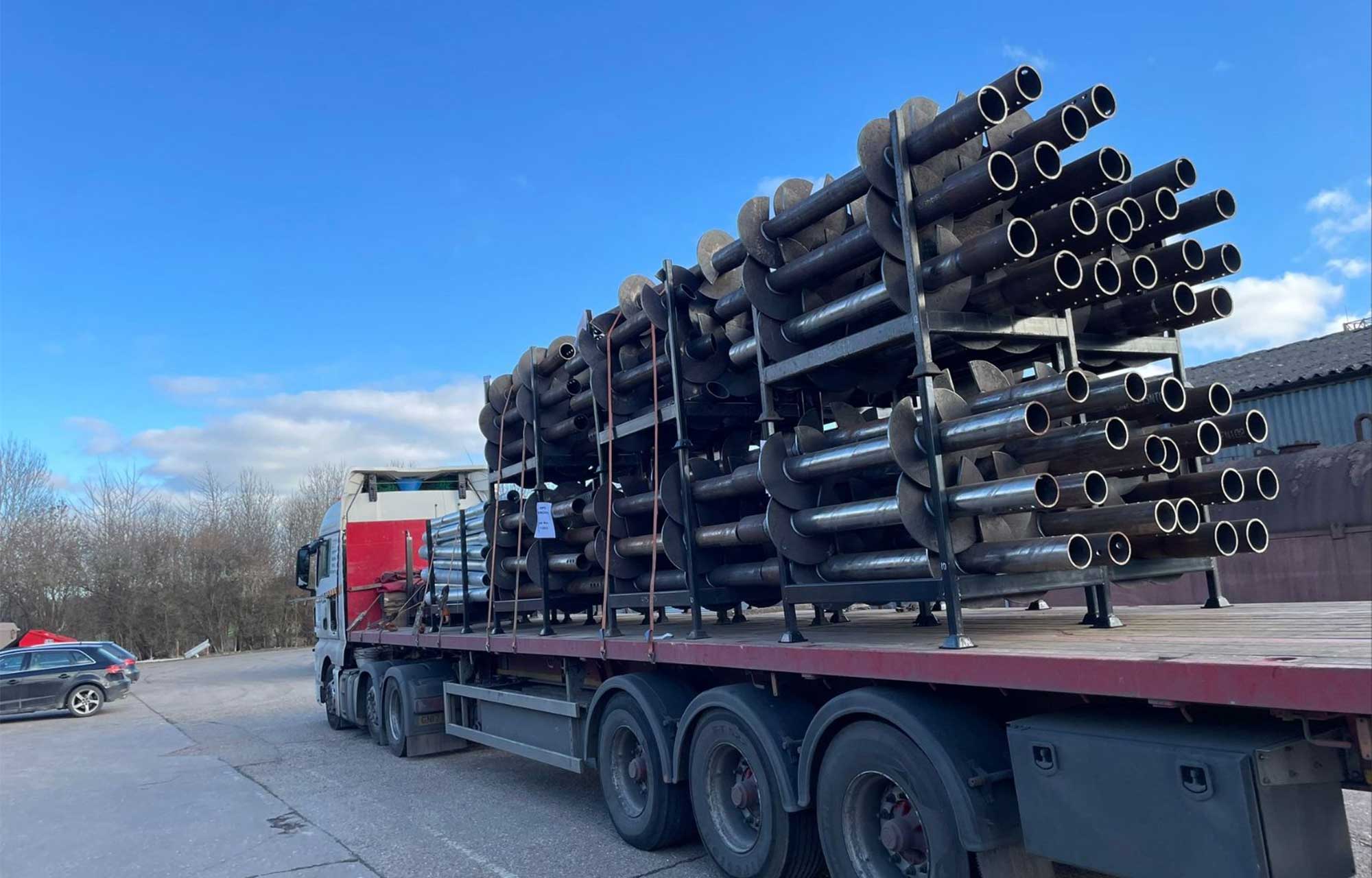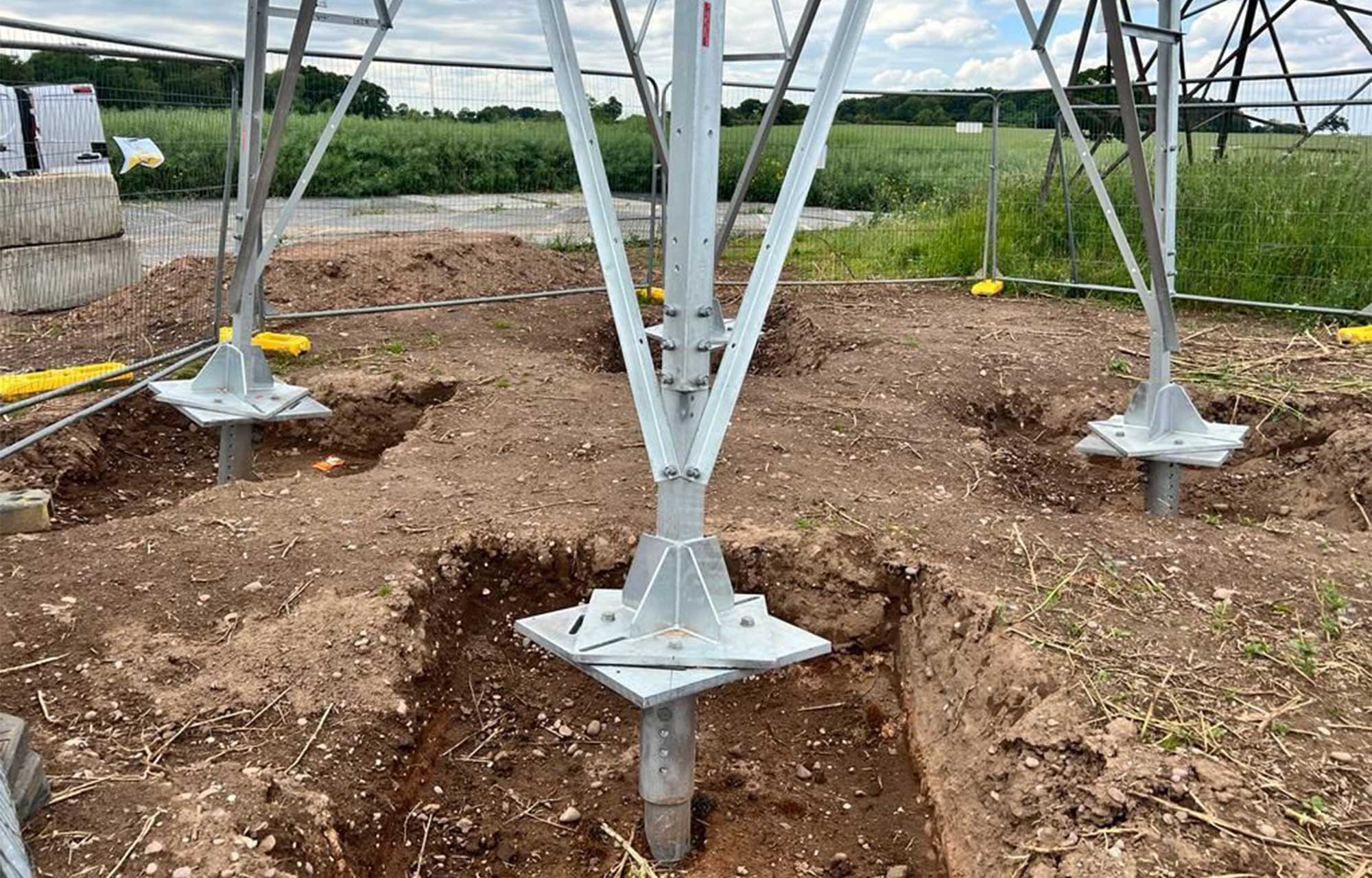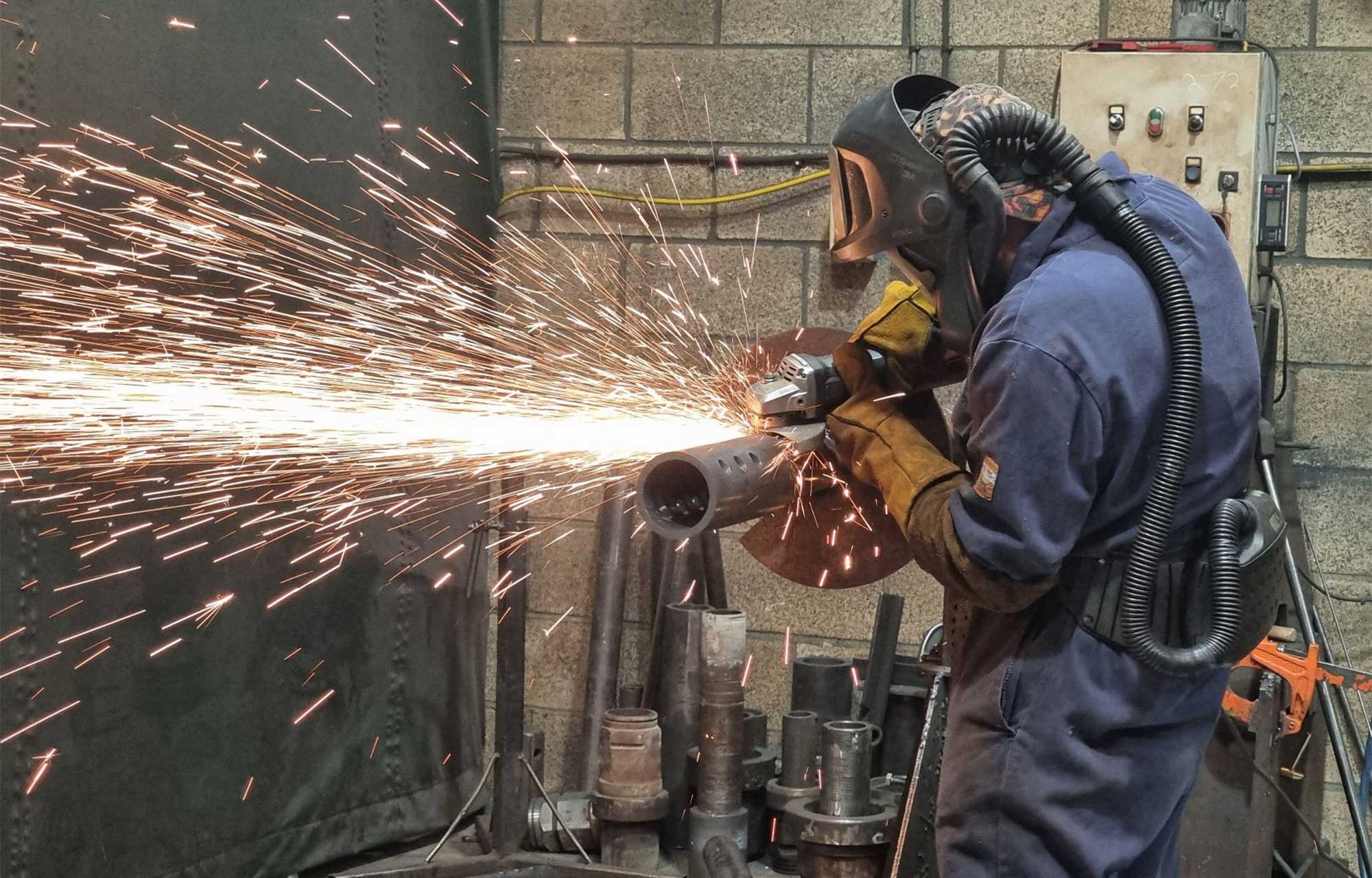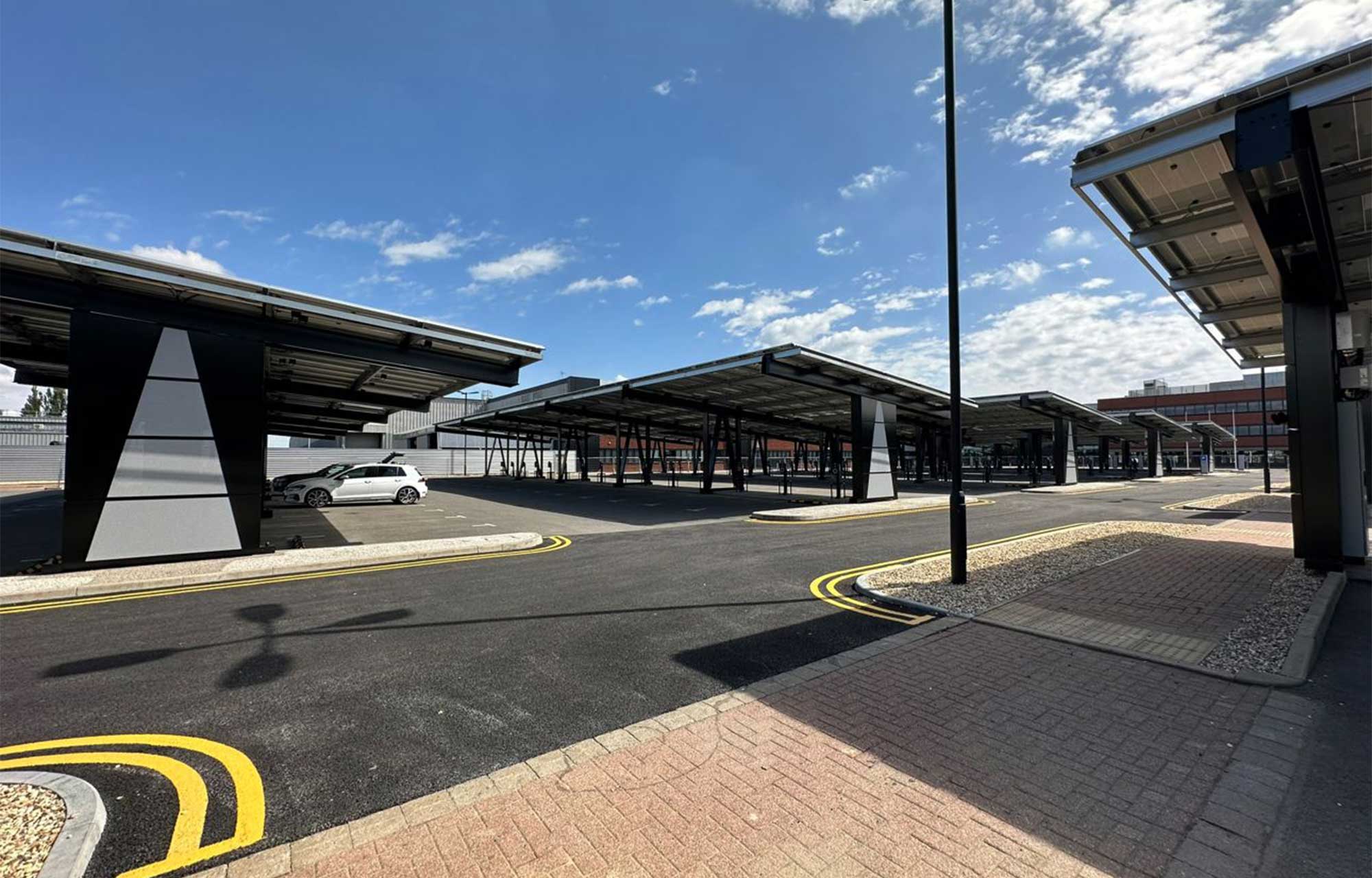Helical Pile Solutions
Securing Energy Transition
Helical Pile Solutions is securing the energy transition by fixing renewable infrastructure to the ground with specially designed helical pile foundations. Strong, affordable, and fast to roll out, this is an application with so many positives for engineering firms. Founder and Operations Director Peter Farr talks to Energy Focus about building the business based on service quality.
The strength of any structure is the foundations. In the energy industry – where companies are under extreme pressure to produce more energy, cleaner, cheaper, faster, and greener – there is an infrastructure challenge looming with significant engineering required to ensure the physical platforms exist for turbines to spin, solar panels to stand, substations to switch volts, and pylons to carry electricity.
Around the world, weak planning and outdated thinking see energy projects pinned to the ground, destined to fail. Some wind turbines can face wind speeds of up to 90km/h and the towers need to hold the turbines as it generates vital green power. Solar panel support frames must cope with average weights of around 25kg per panel – with some of the world’s largest installations home to more than five million panels. Solar carports that cover just one car can require 10 panels as well as significant steel structure. Electricity pylons can weigh at least 700kg. Anchoring these assets to the ground is critical in support of the long-term energy transition.
In the energy sector, there is a solution that is often cheaper, faster, and less intrusive. Helical piling, also known as Screw piling, uses steel tubular shafts that are rotated into the ground without the need for concrete, creating long lasting foundations that are stable and resistance to corrosion.
“We worked on a project for a major energy engineering firm installing helical piles to support transmission towers,” explains Peter Farr, Operations Director at Helical Pile Solutions Ltd (HPS), a UK industry leader in the field. “Generally, this type of project would use concrete foundations, however this requires huge excavations and large amounts of materials being removed from site. It takes a long time to put towers up, and that costs more money.”
Peter Farr has been in the industry for more than two decades and is a leading mind when it comes to foundations for industrial applications. He was part of the team that introduced helical piling to the UK, and co-founded Helical Piling Solutions back in 2021.
“The President of the engineering company visited site to watch us put up a tower that would, in concrete, take six weeks. We had the foundations down in five hours and the tower up in two days. He asked the team on site: ‘Is that it?’ They measured it and checked all tolerances had been achieved and found everything to be perfect. He was amazed at what he had witnessed and advised that they would certainly be looking at helical piles as a replacement to concrete.”
CHANGING METHODS
Large and heavy steel shafts with screw-like flanges are mechanically twisted deep into the ground and can be installed very quickly. Sometimes, no pre-drilling is required, and the piles can go into various soil conditions. Installation is cheaper than traditional foundations and durability is high. Use of helical piles is widespread and can be used in various construction projects, however HPS is targeting energy infrastructure because of the need for robust solutions and wide-open market for innovation.
Recent success was demonstrated in Milton Keynes where a leading international car manufacturer began a process of installing solar carports on site to generate renewable energy while protecting cars from the elements. The construction firm approached Helical Pile Solutions to secure the heavy structures to the ground, and they delivered.
“I know the industry and it is all about getting people to rethink the way they build future projects,” Farr says.
“It is a showcase for their site and as the industry gains momentum, more and more clients will see the benefits with the market growing quickly in the coming years to well in excess of £20 million per year, just in the UK.”
The carport has EV charging capability built in, and uses cantilevered canopies to ensure maximum power generation. Already proven across more than 500 car parking spaces in the UK, this solar carport concept, and the industry itself, is set to grow exponentially as the EV transition continues. “It is one of the larger solar projects in the UK. This phase was only 1MW and a small portion of the client’s current car park. There is plenty of opportunity to scale up further there,” says Farr.
EXPANDING TEAM
The ambitious entrepreneur and industry veteran partnered with Managing Director Nic Brooker to build HPS. Brooker an expert in steel manufacturing and Farr one of the voices of helical piling in the country, the pair have lofty aspirations.
“In Europe and especially in America, it’s a completely different ball game,” smiles Farr. “We know that there is a big push in France where more than 300 sites are being explored. We’re looking to push into Europe and when that happens, we will expand the management team accordingly. We have fabrication covered in the UK having invested nearly £1m in the state-of-the-art machinery to deliver all of the manufacturing process in house. Installation-wise, we have two teams that we can expand as and when required. Our overheads are low, and that allows us to build in competitive costs for our contractors.”
Currently, the business is headquartered out of Cambridgeshire and can service clients nationwide. The piles themselves are carefully crafted depending on client spec and can be delivered nationally against tight deadlines.
“We can deliver everything required for a helical piling application. We do lean on external consultants during our design process, but we do all the design calculations in house and then have these checked and signed off by those consultants,” declares Farr.
“We offer bespoke design, manufacture, supply, and installation of helical pile foundation solutions. Depending on the client requirements, we can tailor this to be supply only, design and supply only, supply and installation only, or whatever they need. We can be very flexible around their requirements.”
He is keen to underpin the company’s commitment to quality – both product and service. While others in the helical pile industry can produce these products, few can match the knowledge, quality and service excellence of HPS. Still relatively young as a business, HPS must separate itself by more than just good products.
“We are here to build lasting relationships with clients that will endure well into the future,” details Farr. “Repeat business and recommendation is what keeps a company going and we are receiving positive feedback repeatedly upon completion of each project. We offer the complete support required and that has been our focal point since we started the business. We provide quality products, quality service, and after sales support that the client can rely on.
“Our installation contractors are key and they all have 20+ years experience. The execution of the work is the key link in the chain. Without the experience that I have access to, we would never get projects over the line. I work with the best installers in the UK for this product, and that gives us a great platform.”
He reminds that the manufacturing arm of HPS is agile and nimble and very reactive to client needs. “They shift and move quickly to make things work, and that is a benefit that we can offer to clients. Most of the time, these projects are planned well in advance, but there are instances where we have emergency jobs that need to be turned around in very short periods and we can always deliver what we say we will.”
‘WE HAVE BOOMED’
Because of the success built within HPS to date, Farr is happy to report that his initial expectations have been exceeded year on year. “I thought we would start off slow working purely on smaller civils projects, but we have boomed and I have to thank those around me for that,” he says.
“We have far exceeded our initial expectations in year one and two. We are expanding into industries that I didn’t think we’d get into so early,” he adds, citing rail and highways as new areas where HPS is seeing an uptick as the company works towards ISO 9001 accreditation.
“The amount of exposure and the work we have done in just two years is unthinkable. I could not have imagined growing the business to the size that it is in the current climate. We are now a recognised brand in the UK for helical piling and many tier one contractors are approaching us as their preferred subcontractor due to the services we provide.”
In the future, this quickly growing business has major potential because of the knowledge, expertise, and unwavering commitment to excellence. Already proven on and in the ground, helical piling is perfect for energy industry applications and its preferential cost will assist in the transition as more pylons and carports are required.
“Energy projects are where we are really focussed giving the infrastructure demand the country needs to transition to Net Zero and this includes transmission, substations, solar carports, solar arrays, and turbines,” says Farr.
“Many continue to use traditional concrete methods – this is what engineers use as standard foundations, but they need to diversify to speed up their programmes. We are demonstrating how our innovative product can be a benefit to them.”
Able to deliver foundation piles as well as torque drive units for hire or sale, the company can deliver a turnkey solution.
“We are confident in what we can achieve however people are always sceptical. We deliver projects within budget, programme and to the highest quality that our clients expect and these clients are always delighted upon completion knowing we deliver what we promise, finished to the highest of standards.” highlights Farr. “The feedback we receive is that we give people the confidence that their projects will be delivered successfully – that is what we thrive on.”
In August 2023, a UK council unveiled a solar carport project on its site, claiming that it would save £150,000 p/a on energy costs. At the same time, new T-shaped pylons are being erected to carry modern green power from a growing number of offshore wind farms around the country. Substations and battery parks are going up, or slated, at sites all over the UK, and the largest onshore wind farm is in development. Now is the time to fix infrastructure down for a future of green, low carbon electricity.
“We are small business but we deliver for big projects,” concludes Farr.




